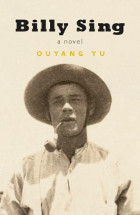Billy Sing, a novel by Ouyang Yu

Transit Lounge Publishing, 2017. ISBN 9780995359444
(Age: Adult) Billy Sing was a Light Horse Trooper who served at
Gallipoli and later on the Western Front. A fine marksman even
before his military service, Sing became Australia's most famous
sniper with 150 confirmed kills. Other sources place his tally as
high as 300.
Sing was born to a Chinese father and an English mother and would
have suffered from the racist attitudes which prevailed at the time.
Ouyang Yu lends a narrative voice to Sing, telling his story from
beyond the grave and conveying an intellectual and emotional
dimension which emphasises his humanity and fragility. This is
important given that Sing was known as 'The murderer' or 'The
assassin' by his fellows and history frankly records him as the
highest scoring killer in the Australian army.
In the text, Sing is depicted as being much younger than he actually
was at the beginning of the First World War and the author possibly
sought to emphasise his physical and mental toughness. There is a
great deal of conversational philosophy and deep reflection on human
relations which is often difficult to accept given that this is work
of fiction. Sing's war service, whilst a central feature of the
book, was not detailed as prominently as I would have expected.
Perhaps this underlines that Billy Sing's life was much more than
four years spent as a soldier. The fact that the famous author Ion
Idriess was Billy's spotter is referred to only obliquely and
historical detail is presented as poetic recollection of individual
incidents, rather than in a more familiar narrative style.
The author does achieve his goal of making the reader understand the
appalling treatment that Billy endured during his difficult and too
short life. It is clear that what was just and fair had no bearing
on the life of Billy Sing and those he loved.
This is a complex work which may suit some adult readers.
Unfortunately the inclusion of the worst known profanity in the
opening lines of the novel (for no clear reason) would make this
book an unsuitable acquisition in most school libraries.
Rob Welsh